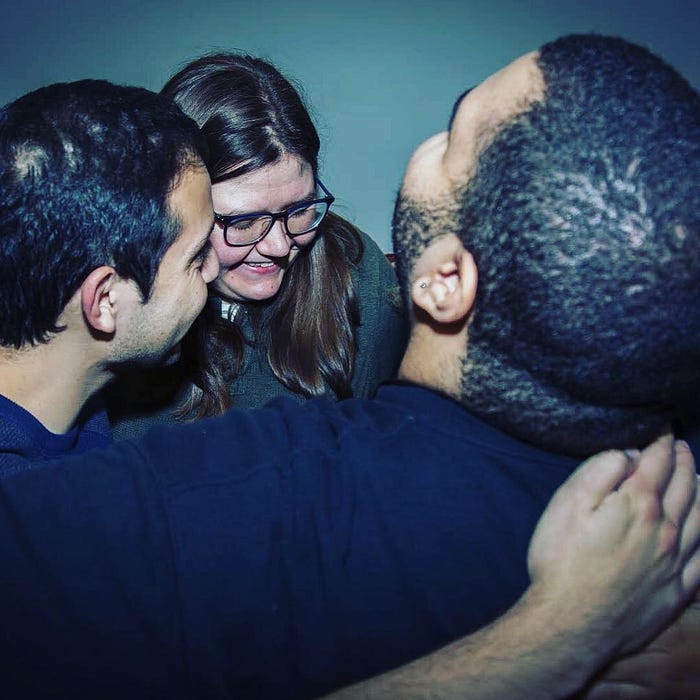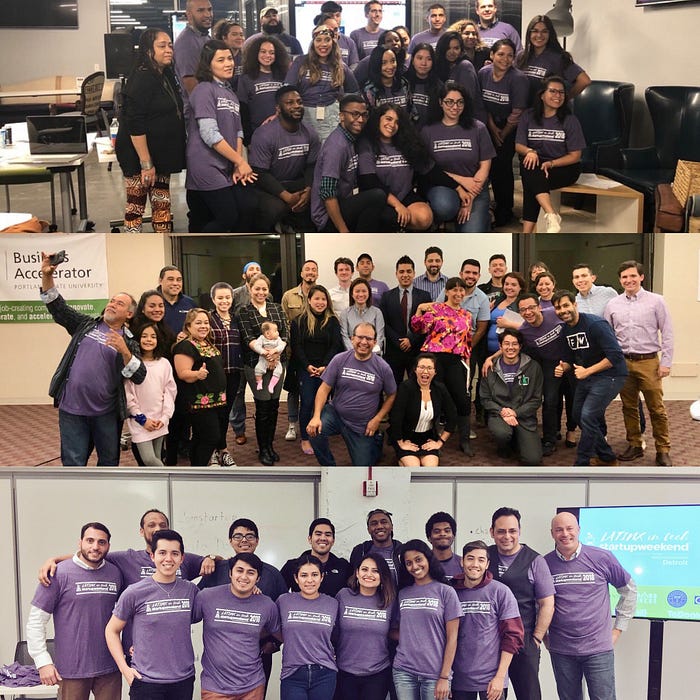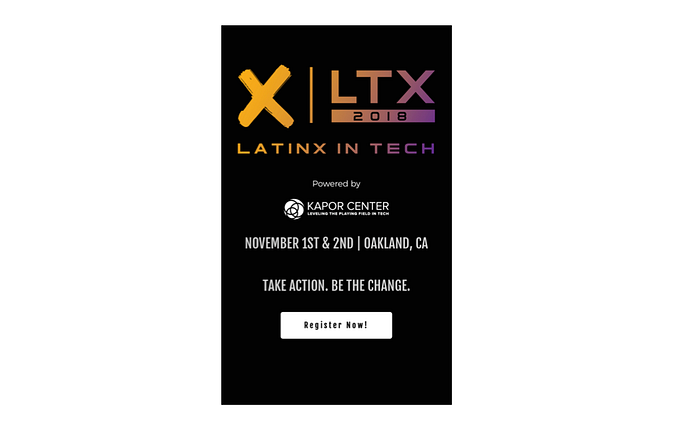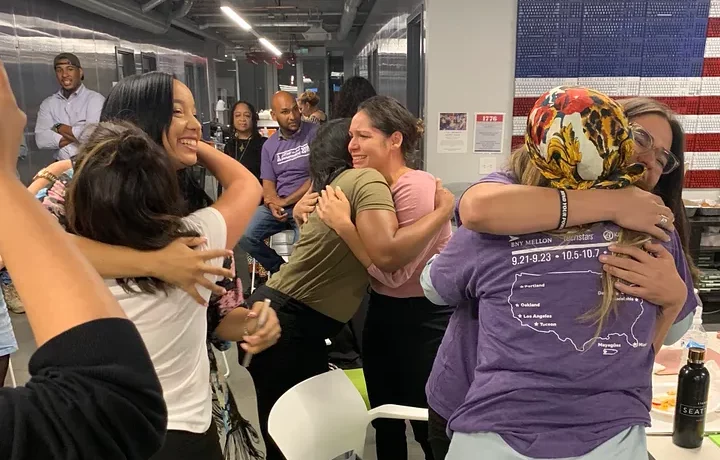Our Latinx community is incredibly powerful. More than that, we’re integral to the ever-changing landscape of the United States, and in turn, to the changing landscape of the tech world. So why shouldn’t we be at the forefront of the industry? We should, and that’s why across 10 cities across the country we’ve worked to meet the community where they are at, led by local Latinx leaders in partnership with Techstars Startup Weekend Programs.

We wanted to be proactive in bringing to life dynamic startup programs tailored for local Latinx community in cities like Boston, New York, and Los Angeles with passionate members of the local community looking to break into the tech startup world. We wanted to go beyond the typical “diversity problem panel” discussion and focus on ACTION. Through hands on learning over 3 days partnered with established Latinx mentors who understand the value of our people, participants learned by DOING. These Latinx in Tech activations are only the beginning in helping our community move beyond being consumers to makers and owners. To continue the personal and technical skill growth beyond the 3 days, this November we are hosting a first of its kind conference in Oakland, a bridge away from Silicon Valley, with the sole goal of empowering Latinx product managers, developers, marketers, entrepreneurs, and other budding techies to achieve their dreams.
Consequently, Latinx in Tech Summit — LTX 2018 — (and events like it that are geared toward bolstering communities of color in tech) will prove to be one of the most timely and important tech conferences in the U.S., because it can bridge the gap between an incredibly powerful force mired in a huge diversity issue with the motivated, tech-savvy people perfectly positioned to solve it. Together with the perspectives of participants like Derrick Reyes, Annette Gonzalez, Jonathan Vasquez, and Nerma Albertorio — Startup Weekend: Latinx event participants and organizers from across the country — we can actually prove it.
THE MOST TIMELY & NEEDED TECH CONFERENCE IN THE U.S. — A PROOF IN 3 PARTS
1) The Latinx community is critical in navigating, and ultimately solving, the tech industry’s diversity dilemma:
Jonathan, Annette, Nerma, and Derrick each explained that spaces like those created at their respective startup weekends are unfortunately rare.
“I just had never been in a space that was both tech and Latinx people-focused at the same time, and I thought it would be really cool to go in and see what was going on,” Derrick, an NYU graduate school alum who now is in coding school said, thinking back to his very first startup weekend in New York two years ago.

“A long time ago, I felt that — still feel that — there are not that many spaces for Latinxs to get exposed to a startup in a way that they could really launch an idea,” Jonathan, a tech consultant and one of the Startup Weekend: Boston organizers, told me. “When I moved to Boston last year, I made a personal goal to host an event that would get us to the Latinx community.”

“I’ve been in business a long time,” Nerma, founder and executive director of Centro para Emprendedores based of Puerto Rico, said. “I’ve never seen anything like Startup Weekend, have you?”
Unlike Derrick and Jonathan, Annette did not have as much background in tech and was new to the community fostered at Startup Weekend: Philadelphia.
“I live in Brooklyn — we don’t have that opportunity, we don’t have resources like this where I’m able to be in the same room with all the mentors,” Annette said. “Just being able to literally have them in the room with me for as long as possible, and pick their brain, and ask them 100 questions to get the business just right — it was really different.”
Our community, like many Black & Brown communities, has been historically deprived of equal access to opportunity in schools, in universities, and in the workplace. But as the needs of our nation continue to outweigh the capacity of the homogeneous tech outfits that respond to it, that problem will only get worse.
“If you think about it, in the year 2050, our numbers are going to double from 56M to 106M as a whole,” Annette told me when I asked what she thinks she means to the larger tech world. (The Pew Research Center’s updated projection for the 2050 Latinx US population confirms her hypothesis.) “But that’s saying there’s going to be more kids, not more adults, right? If we’re not working together as a community to develop more opportunity for the youth, then what do we have?”
It is imperative that we understand our challenges as we will change depending on who lives among us. So too, must the strategies, tools, and technologies we use to topple those challenges.
2) LTX 2018 can foster the environment needed to recruit the talent the industry so desperately needs:
We now know that the tech industry has a serious problem cultivating and retaining young, diverse talent, specifically in the Latinx community. We also know that there are hundreds of billions of dollars at stake for tech companies ready to take the necessary steps forward to continue to grow healthily and responsibly to serve a constantly adapting world. We even know that 47% of all millennials, the oft-bemoaned generation that more importantly will constitute the majority of the world’s workforce for the next few decades, actually want to work in a diverse workplace.

LTX 2018 bridges that gap, as already evidenced by the success of the Startup Weekend events like the one Annette attended.
“Off the bat, I know what startup weekend is, but the word “tech” and “Techstars”… I was a little bit intimidated,” she said. “I’ve never done this before and [didn’t] know what to expect. But because it was Latinx, and my brand is heavily focused in the Latinx community, and I am Latina, and there aren’t many resources for Latinx, I decided you know what, why not, right?”
Annette, by her own admission, would not have shown up at all had she not felt as though her identity as a Latina was respected and welcomed. There are millions of people like her who simply need an opportunity to meet the right mentors and make the right connections to realize their potential in tech. We desperately need all of them.
Derrick is the newly minted CEO and co-founder of Queerly Health, an app that would provide affordable and accessible care to members of the LGBTQ community. He had the formal training to feel comfortable in the tech startup space, even at his first weekend, but explained that he was somewhat apprehensive about pitching this idea, worrying it wasn’t geared enough toward the Latinx community until someone matter-of-factly changed his mind.

“By virtue of being Latinx, whatever I decided would be fine, but I also decided that whatever I pitched, if this wasn’t the space, I would make it so,” he said. “But I also spoke to Carolina Huaranca of Kapor Capital and she said, ‘Well, it’s Latinx, so that encompasses the queer and Trans community.’”
Derrick’s idea was allowed the space it needed to breathe and grow, despite his trepidation. The diversity found at Startup Weekends in New York (or Philadelphia, or Boston, or Puerto Rico or the 6 other cities, or at LTX 2018 here in Oakland) demands we acknowledge that the Latinx community necessarily contains the LGBTQ community, and vice-versa. It would be disastrous if the innovations that come from the people navigating their intersectionality were ignored, or worse still, abandoned because its creator believed that it would be viewed as out of place.
In some cases, it is necessary to go the extra mile to recruit talent from places not typically considered or often overlooked. Nerma explained how life following Hurricane María in Puerto Rico forced them to cast a wider net when recruiting Startup Weekend participants.
“It was amazing this year because for the first time we had even more people participating,” she said. “Previously, we’d seen more students or people who are going into tech more easily, and this year we’ve been receiving more adults… and so they were working through the process and very participatory and they were not different [from those with more experience], which was amazing.”
Annette, Derrick, Nerma, and Jonathan have the skill and work ethic to succeed despite the roadblocks, but it is unequivocally clear that the status quo delays their success, and in turn delays American innovation as a whole. LTX 2018 is uniquely positioned to turn the tide in a time at which we cannot afford to wait to change.
3) The issues tech is *here* to solve in our larger world cannot come about without the full engagement of the Latinx community. Tech needs the Latinx community to be impactful. :
“I know that a lot of us just don’t even go to healthcare services period, and sometimes years at a time, because we’ve experienced some sort of discrimination, or had to teach the providers what to do, or were just flat out barred from going,” Derrick said. “And also the LGBTQ community is distributed across the country. It’s such a big undertaking, aggregating the community in order to even use it.”
Derrick’s response is powerful and important for this proof. Organizing people is extremely difficult. It takes care and consideration for the community, as Jonathan explained, to even coordinate the optimal time to host an event. It’s practically impossible to do if you aren’t even looking to collaborate with these communities in the first place. If tech stays overwhelmingly white and male, and as long as there remain unpatched leaks in the pipeline, identity-blind solutions to infuse the sector with more talent will always and repeatedly fail. The concerns of the marginalized cannot be sufficiently addressed by the people who pushed those concerns and the people who harbor them to those very margins.
And for people like Annette, once she ascends to where she wants to be, she feels an obligation to give back to her Latinx community in Brooklyn, something that is simply not typical of the average tech corporation.

“I am not a representation of a disadvantaged community, I’m actually part of it and I just made a way for myself like so many before me and so many like me, we just make ways for ourselves,” she said. “But there are so many kids who don’t know how to do these things, and it’s still not as accessible. If we want these things, these resources, we have to have a friend like Delilah Dee, we have to know where to look for these things. I want to go back to the Latinx community, where we’re constantly being overlooked.”
With the tools, mentorship, and opportunity customarily given only to a select group of people, the participants of the various Startup Weekend Latinx in Tech events across the country and those who will soon arrive at LTX 2018 in the Bay Area have the power and political influence, if exercised, to change the world for the better.
For Nerma and the other members of the Startup Weekend ecosystem in Puerto Rico, the further development of tech entrepreneurs in the Latinx community — on the island specifically — is a matter of self-reliance and survival in the wake of Hurricane María and a shamefully insufficient recovery response from the federal government.
“After the hurricane, Maria, we decided to use Startup Weekend as our startup research too,” Nerma told me. “So that’s why we are organizing across the island, these events are ones that we think with the Kapor Center that are very, very important… to expose our participants to be active in the tech ecosystem.”
We need the Latinx community to be fully represented in the tech sector as designers, builders, and not just consumers. LTX 2018 is a representation of community designing for community — where we bring in the tech space and necessary resources on our terms — with the community outreach and cultural connection to propel the tech industry to a more innovative, more ethical and responsible future. Join us this November 1 & 2 and make sure you’re part of the needed redefining of the tech industry on the community terms.


